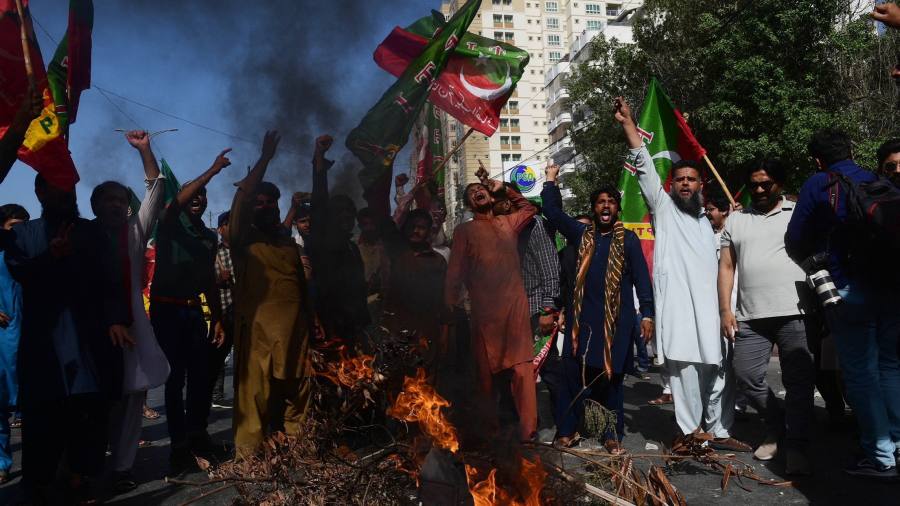Pakistan’s former prime minister Imran Khan is expected to appear before an anti-graft tribunal on Wednesday, as police tightened security across the country a day after the opposition leader’s arrest sparked violent protests.
Khan, who spent Tuesday night in custody, will attend a hearing inside police headquarters in Islamabad, according to a police statement. Government investigators are expected to seek to remand him into custody for 14 days, the legal maximum.
Authorities in three of Pakistan’s four provinces imposed emergency orders on public gatherings after unrest erupted on Tuesday when Khan’s Pakistan Tehreek-e-Insaf party called for nationwide protests. Two people were killed and several injured as the turmoil spread, according to the party, and a crowd in Lahore set fire to the gates of a military general’s home.
Officials at Pakistan’s main telecoms regulator said internet services and digital platforms including Facebook, Instagram, Twitter and YouTube were blocked in parts of the country. Local media reported that police in Islamabad were ordered to carry firearms on duty, while school and college exams were cancelled.
Khan, a former cricket star and the country’s most popular political figure, served as prime minister from 2018 until he was ousted by parliament in April last year in a no-confidence vote.
His party is the favourite to win elections in October this year, but he faces a barrage of legal challenges that could disqualify him from running. These include allegations of unlawfully selling gifts he received as prime minister and terrorism charges related to protests by his supporters.
His arrest by anti-corruption forces on Tuesday was related to a land purchase by a charitable trust controlled by Khan and his wife Bushra Bibi, Pakistan’s interior minister Rana Sanaullah told reporters.
Khan, 70, has dismissed the charges as politically motivated and maintains that his removal from office was the result of a western-backed conspiracy. He has campaigned across the country for snap polls, inflaming political tensions at a time when the country is mired in a severe economic downturn.
Analysts said the administration of Prime Minister Shehbaz Sharif, whose government is struggling to revive a $7bn IMF bailout, has resisted early polls, fearing a significant public backlash.
In March, the threat of his arrest sparked clashes between his supporters and police outside his residence in Lahore, while in November, he was shot in the leg at a political rally in Wazirabad, Punjab province, in what he has claimed was an assassination attempt by senior officials.
He reiterated that claim at a rally at the weekend, drawing strenuous denials from the military.
Leading business figures have warned that the latest unrest could delay negotiations with the IMF. The fund has sought more reforms before it disperses the next $1.1bn tranche of the support programme, which could pave the way for additional loans that would allow Pakistan to forestall a balance of payments crisis. The country’s foreign reserves have dwindled to only about one month’s worth of imports, leading to shortages of essential goods.
“Under the present circumstances, how can anyone looking at Pakistan safely say that they are lending to a country which can run its affairs smoothly,” said one businessperson who asked to remain anonymous. “The ongoing uncertainty must end.”
Read the full article here
